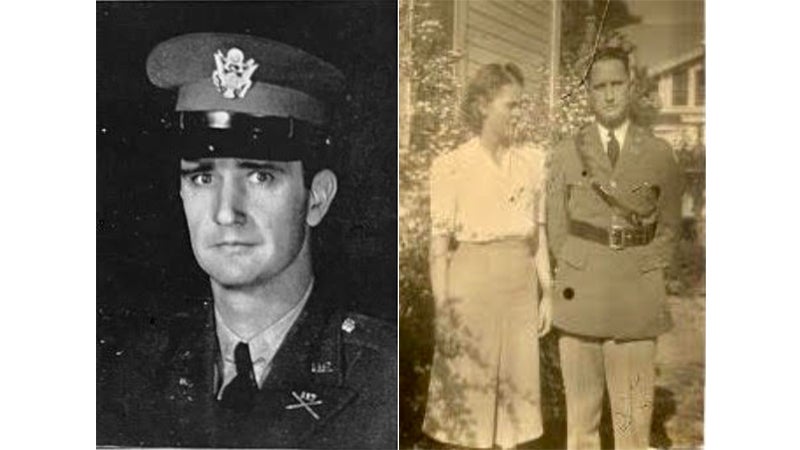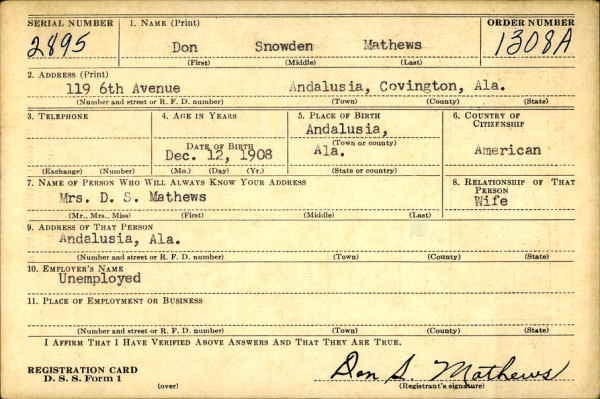Don S. Mathews, Lt. Col., Army National Guard, WW II, Korea Part 2
Published 1:00 pm Friday, September 1, 2023

- LEFT: 1st Lt. Don S. Mathews as a member of the 117th Field Artillery Regiment, Andalusia, Alabama. [Photo: John Vick] RIGHT: 1st Lt. Don Mathews and his wife Mary, sometime prior to WW II. [Photo: Charles Mathews]
|
Getting your Trinity Audio player ready...
|
The author and Covington Veterans Foundation extend our deepest sympathy to the family of Korean War veteran, Captain Herb Carlisle, who died August 26, 2023, at the age of 94.
On March 22, 1945, elements of Lt. Gen. George S. Patton’s Third Army crossed the Rhine River into Germany near Oppenheim. About a week later, Major Don Mathews and the 933rd Field Artillery Battalion [FAB] found themselves at the Rhine, near the city of Mannheim. The 933rd was under the operational control of the 44th Infantry Division which was attacking the city. The city had already been shelled because of the resistance of German Wehrmacht forces still there.The civilian population had wanted to surrender, but the Wehrmacht had executed several civilians who raised white surrender flags. The shelling started fires on the night of March 28, and the Wehrmacht was forced to flee. After they were gone, Nikolas Quintus, a city official in Mannheim [the mayor had already fled the city], made telephone contact with Major Don Mathews. The 933rd FAB Command Post and Fire Direction Center had set up operations in the Kafertal Waterworks in the northern part of the city. Major Mathews relied upon Captain Franz Steinitz MD, the battalion medical officer, to translate. The negotiations continued through the night of the 28th and into the morning of the 29th.
After consulting with the 44th Division commanding general, Major Mathews relayed surrender terms to the Mannheim city officials. The 44th artillery had continued its block-by-block attack on the city overnight. To prevent further destruction, Quintus accepted the surrender terms late in the morning of the 29th. The formal surrender took place when city officials crossed the river and brought flowers to the American soldiers on the other side.
The incident was the first ever telephone negotiation of a surrender. It was sensational enough that the BBC announced the surrender shortly after it happened. A bronze plaque would later be placed on the Kafertal Waterworks building, commemorating the peaceful turnover of the city. The plaque was quoted in Part 1 published in the August 26th Andalusia Star-News.
Some nine months after the surrender of Mannheim, a staff car carrying Lt. General George S. Patton was involved in a car crash in the Kafertal suburb of Mannheim. The general died as a result of the crash on December 21, 1945.
The month of April 1945 was the last full month of combat for Major Don Mathews and the 933rd FAB. He arrived back in the States on September 20, 1945, and was separated from the Army on March 4, 1946. After four months back home in Andalusia, Mathews was offered a chance to join the regular Army with the rank of Major. He accepted and was ordered to active duty on July 5, 1946, and sent to the Artillery School at Fort Sill, Oklahoma. The family moved to Oklahoma and Charles enrolled in school at Lawton High School. In May 1948, Charles graduated from high school and enrolled at Alabama Polytechnic Institute [now Auburn University]. About the same time, Don received new orders.
Mathews was assigned as a United Nations Observer to the Middle East during the Arab-Israeli conflict of 1948. The conflict arose when the British ended their Mandate for Palestine on May 14, 1948. At the same time, the Israeli Declaration of Independence was issued and a coalition of Arab states invaded the territory the following day.
The United Nations sent Swedish Count Folke Bernadotte to mediate a peace. On September 17, Major Mathews was in a motorcade in Jerusalem carrying Bernadotte to a meeting when the Jewish underground organization, LEHI, attacked and killed the Count. Mathews was riding in the car directly behind the Count’s but was not injured.
After he returned from the Middle East in 1949, Mathews was assigned to Fort Benning, Georgia. A year later, he was given orders to Japan and promoted to Lt. Colonel. He was assigned to the 3rd Infantry Division and alerted for a move to Korea.
Mathews served in Korea with the 3rd Infantry Division and took part in the Battle of the Chosin Reservoir that took place November-December 1950. After some 30,000 U.N. forces were surrounded by a much larger Chinese Communist force, the U.N. forces were evacuated from the port of Hungnam. Mathews was part of the evacuation.
In February 1951, Mathews was part of the U.N. force that had pushed north to reach the South Korean capital of Seoul. During that operation, Mathews suffered a ruptured appendix on the battlefield and had to be evacuated to a hospital in Japan.
In March 1951, was given a new assignment in Tokyo, Japan. After his wife joined him in Japan, Mathews was assigned to Okinawa. He would spend two years there before being sent to Chickasha, Oklahoma, as an advisor to the Oklahoma National Guard. While they were there, their son Charles was sent to nearby Enid, Oklahoma, for advanced multi-engine aircraft training. Charles received his wings in October 1953.
Mathews was again assigned as a U.N. observer during the Arab-Israeli War of 1956. On one occasion, his Jeep was hit, destroying a footlocker in the rear of the Jeep. Mathews remarked that this was his most dangerous assignment because “Both sides would shoot at you for sport.” In 1957, Mathews was assigned to Fort Sill, Oklahoma, again.
In the summer of 1958, Mathews underwent kidney surgery at the Maxwell Air Force Base hospital in Montgomery, Alabama. The operation was scheduled as exploratory but was complicated when the hospital suffered a power failure during the operation. Out of precaution, the doctors went ahead and removed the kidney. Mathews lived with one kidney the rest of his life.
Mathews was still at Fort Sill in late 1959 when he received orders to France. He was assigned to be the U.S. Army’s liaison to the French Ecole de Cavalerie at Saumur, France. The school was originally established to train French Cavalry but had transitioned to train troops of the mechanized Armored Cavalry. Lt. Col. Mathews would complete his military service there and retire in January 1962.
Mathews and his wife returned to Andalusia, Alabama, and he went to work with his brother-in-law, Ed Reid, as an insurance adjuster. Ed Reid was a prominent local attorney and owned an independent insurance adjusting business. Don Mathews later bought the business and named the new company, Reid and Mathews Independent Insurance Adjusters.
Don Mathews’ son, Major Charles B. Mathews, was an Air Force pilot and stationed at nearby Eglin Air Force Base during this time. Charles accepted a NATO position in Brussels, Belgium in 1983. When he returned to Eglin AFB in 1987, Don and Mary moved to Fort Walton Beach, Florida, to be near him. Mary died not long after the move and Don remained at the Westwood Retirement Home.
Lt. Col. Don Snowden Mathews died on March 2, 1993. His funeral was held at Foreman Funeral Home Chapel in Andalusia, Alabama, on March 4. Burial followed at Andalusia Memorial Cemetery, with full military honors. He was survived by a brother, Byron [Georgia] Mathews; a son, Charles B. [Lynne] Mathews; a grandson, Charles B. [Carla] Mathews Jr.; a granddaughter, Mary Celeste [French] Brown; and four great-grandchildren.
John Vick
Information on Don Mathews was furnished to the author by his son, Charles B. Mathews in 2019. Charles Mathews died in October 2021. Further information was obtained from John D. Morrison’s five volume, “Detailed Combat History of the 933rd Field Artillery Battalion in World War II.”





